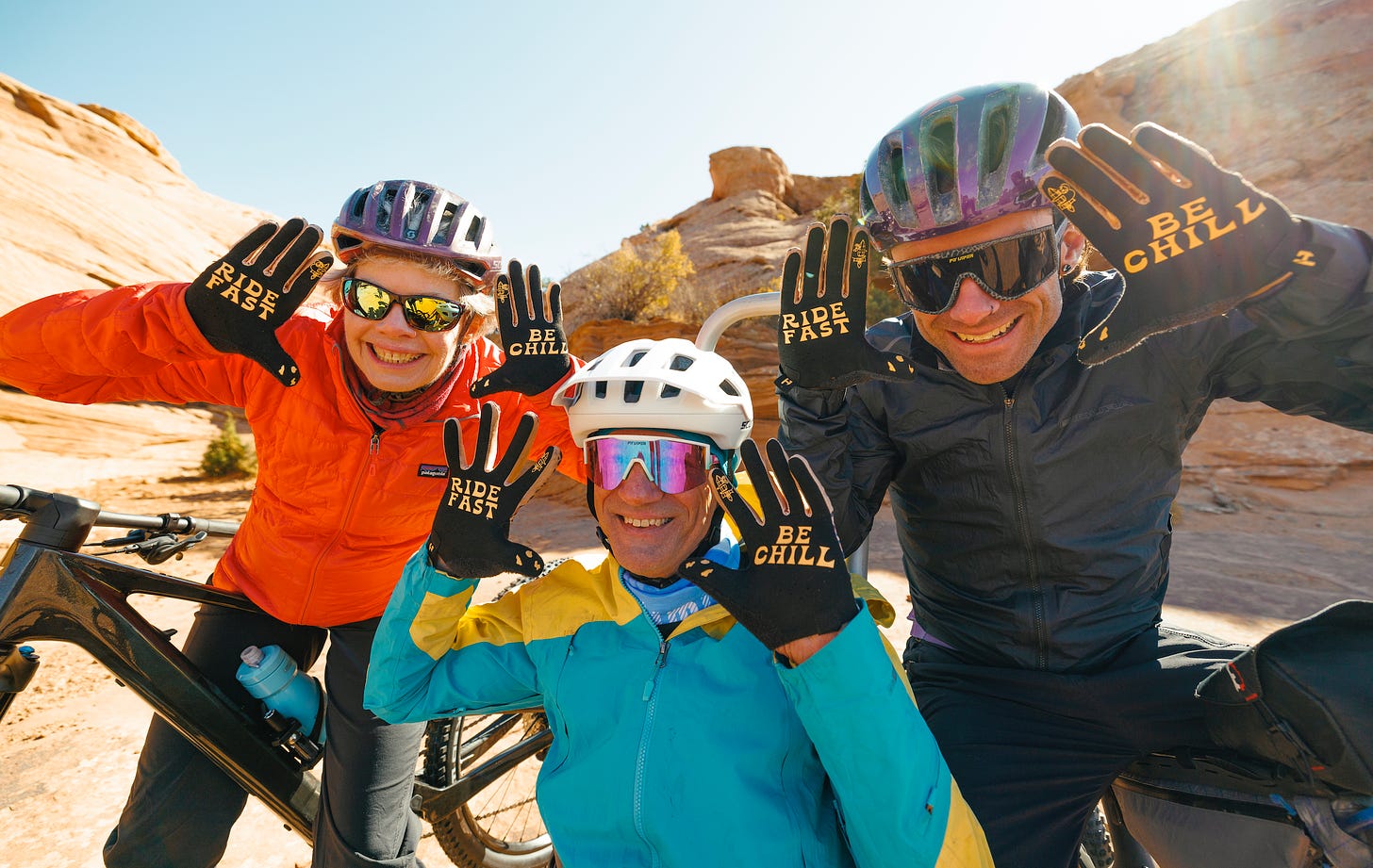Pursuing the Privateer Path: Interview with Professional Cyclist, Ryan Standish
Ryan Standish is a professional cyclist specializing in gravel and mountain biking. He’s a privateer - a cycling term referring to someone who gathers their own sponsorships and funds their season through the support of those sponsors. As Hannah Otto writes in Outside Magazine, “Essentially, privateering means that an individual creates his or her own one-person team.”
In addition to cycling, Ryan was inspired to get involved in promoting advocacy and research for MS following his father’s diagnosis in 2012. He raises funds through BikeMS and via his clothing line, Rocket Sloth. These efforts are a big part of one of Ryan’s self-described goals: “Pursuing a career in cycling that goes beyond just being an athlete.”
I’m endlessly fascinated by people who strive to create their own way of doing things. I wanted to know more about Ryan’s story: How does one pursue a cycling career that goes beyond being an athlete? What did it take for him to carve out a unique path? How does he live out the Rocket Sloth mantra of “Go Fast. Be Chill?” What mindset shift help him deal with fear and tough days while racing?
Our conversation covered:
How Ryan made the decision to pursue professional cycling after college
What he loves about mountain racing and the privateer path
How he’s pursuing a career in cycling that goes beyond being an athlete
The mindset shift he’s made to compete during tough racing days
Overcoming fear after a crash
What’s next for him
Note: The following interview has been lightly edited for clarity and length. While every effort has been made to preserve the integrity of the conversation, please be aware that the quotes may not be verbatim but reflect the essence of the dialogue.
What are you up to in life right now?
I’m a professional gravel mountain bike cyclist. I just moved into a house after living in a van for a year and am currently dealing with all the moving stuff. Soon, I’ll be getting ready to go to Madeira, Portugal for a 4-week training camp.
I listened to an old interview of yours on the Mind Matters podcast where you just spoke about taking some time away from cycling after college. I think you said you took about 6 months before deciding you really wanted to make a go of becoming a professional cyclist. What was the mindset shift you made to decide to go for it?
I’ve taken two breaks from cycling. Not quite retirements, but something similar. First, I took some time off from racing after high school when I took a gap year. After that, I decided to go to college in Durango, Colorado which has a really good cycling team and that got me back into racing.
After college, I decided that I wanted to go to PT school so I started to put more time and energy into doing that. I guess 6 months to a year later I thought, “You know, you can always go back to school. Being a professional athlete isn’t something you can decide to do when you’re 40.” One of the biggest drivers was the fear of looking back and not having tried. I didn't want to regret it when I was older. That was 5 or 6 years ago and so far no regrets.
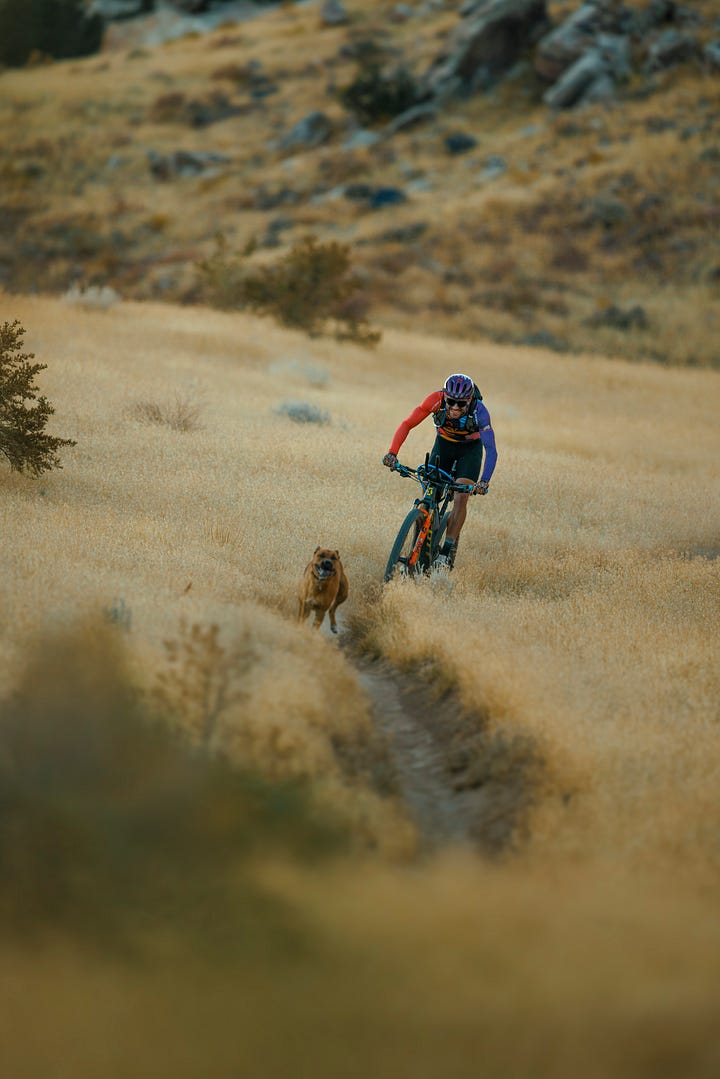
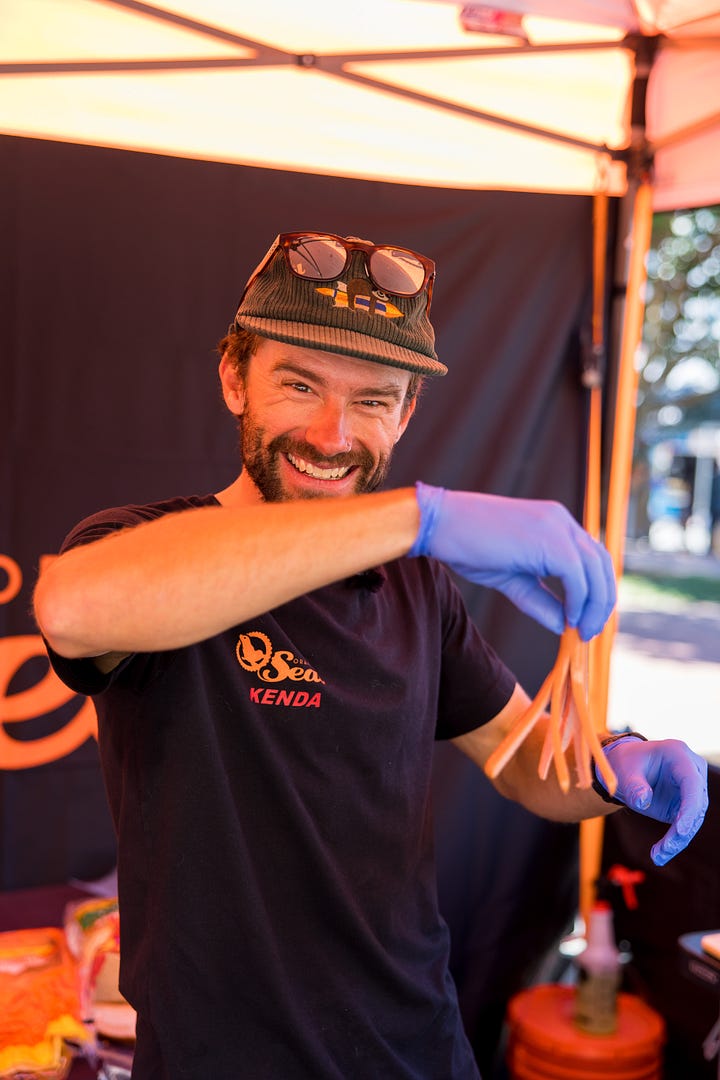
What kept you going in the period between making that decision and working up to being able to be a full-time professional cyclist?
I guess I knew, and the people around me knew, that it was possible. So there was still the light at the end of the tunnel. I was working part-time and was able to support the racing through sponsorships. The biggest challenge mentally was leaving the job even though it was only part-time. It's still consistent income. You know that if you work 20 to 30 hours a week, you're gonna get paid for 20 to 30 hours a week, whereas with the bike stuff it’s not always consistent. Coming into this year has been interesting. A lot of brands in the outdoor industry saw a huge boom during Covid and they started spending a lot of money on marketing and athletes and sponsorships. Then coming into this year, it's slowed down. For a lot of people, that consistent income and contract negotiations have started to fall apart. I'm fortunate to have built relationships where I still have a job, but I know it’s been a really tough year for a lot of athletes and people employed by companies in the outdoor industry. It’s similar to any real job looking at it that way.
Speaking of the financial side of things, I read a really interesting anecdote about you attempting to pursue road racing for a season over mountain biking. You said that the season you spent doing that felt like beating your head against the wall, even though it provided greater financial opportunity. What did you learn from that experience?
It wasn’t easy because I knew that’s where you can make real money. But the flip side is that’s only possible if you’re at the very top. There's less individual character in road racing. You have the team and everyone works for one guy. Training truly becomes your job where you are riding 25-35 hours a week and if you don’t, you might not have a job next year. At least that’s my understanding of road racing.
I wanted to figure out: How can I piece together a privateer one-person program so that I can keep racing mountain bikes? There were a few people doing it at the time, but it wasn't as big as it is now. That is, seeing individuals putting together their own program, race season, and schedule.
It was definitely stressful that first year. When I moved home to Australia to save money, work, and look at coming back to the US, I was living at home and working 40-50 hours a week. I worked at the pharmacy in the hospital, and I worked at a bike shop 6 to 7 days a week and trained on top of that. I would get up at 4:30 in the morning to go ride before work, go to work, then sometimes go to the second job, and then do a gym workout in the evening. I then moved to America with no job lined up and only the money I’d saved while living at home.
I didn't work that first year. I just raced, made it through the year, and then had to get a job after that. I’d decided that I wanted to commit to racing bikes and that was really the big motivation to make a career out of it. I didn’t want to go back to school. I think going in on that a hundred percent, knowing that I could always move home and work again, was the big thing.
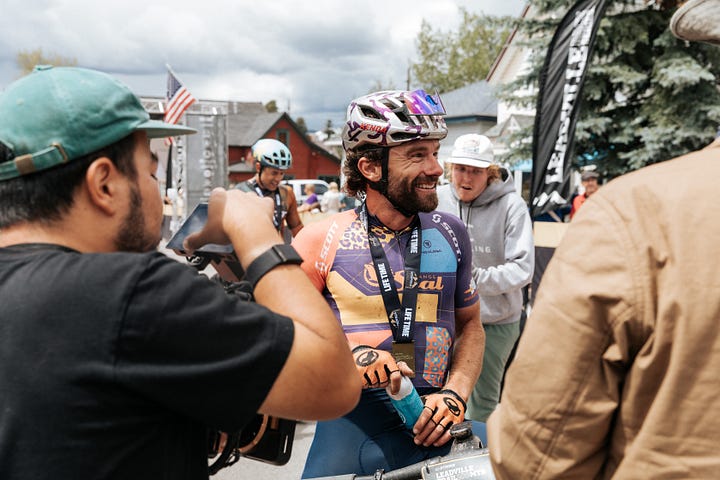
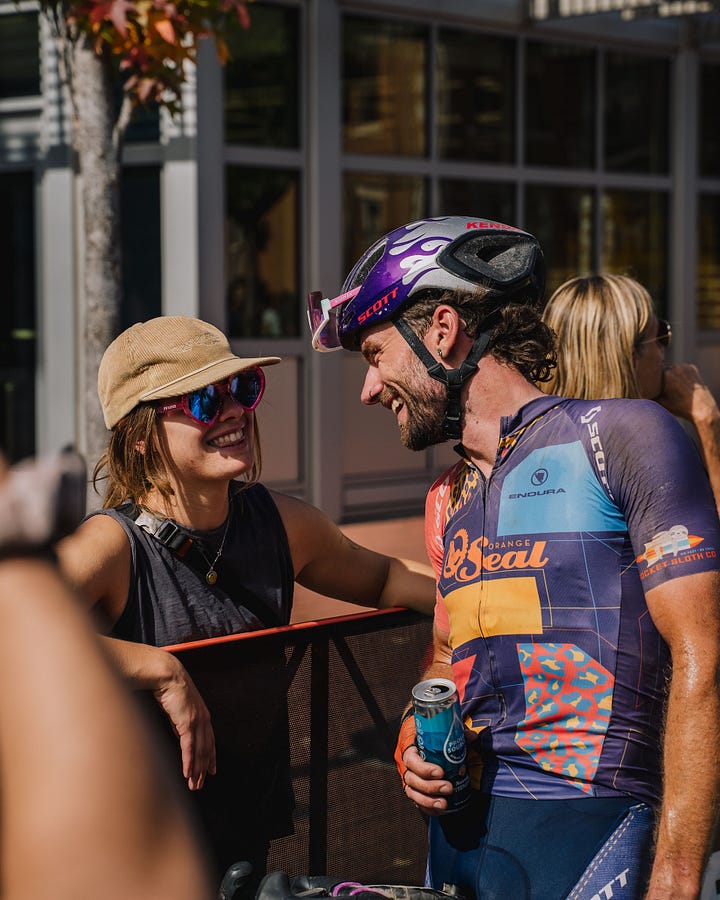
I’m really interested in the privateer mindset you mentioned. What does that mean? What was it about allowing for more character and individualism that really spoke to you?
Mountain biking traditionally has this more laid-back and fun attitude. Maybe it's because there's not as much money in it as the road racing. I think that without having to be part of a big team you have the opportunity to express your character and what makes you weird. Pretty much all cyclists are weird in some one way or another. The mountain biking or privateer direction gives you more opportunity to show that instead of just being another employee like you are on the road.
Tell me if I’m not capturing this correctly. It's a way of being an athlete that celebrates a lot more personality and individualism, and maybe even a way of being an athlete, that you rarely see in other types of sports.
Yeah, I think one thing about a lot of other sports is that athletes are really young when they first get recognized. That’s something pretty unique about cycling and perhaps running as well. People will leave another sport and decide to take up cycling in their twenties. Sometimes you've never heard of someone before and then all of a sudden, they're at the front of races and they came from running or skiing, or some other endurance background. There are a lot of people who played soccer in high school and then got into cycling. It seems like the variety of personalities in mountain biking and gravel is really a product of everybody coming from a different path.
That segways really nicely with something I wanted to ask you. On your website, you wrote that one of your goals is to have a career in cycling that goes beyond being an athlete. You do a lot to raise money for multiple sclerosis research. What has that goal meant to you? What does it look like for you to pursue a career as a cyclist that goes beyond being an athlete?
The biggest piece of it is the MS advocacy and fundraising. That came about because my dad has MS which played a part in me coming back to cycling. There is a small hereditary piece to MS, but it doesn’t necessarily increase your chances of getting it by a significant amount. For me, it really was about: How do you encourage people to pursue what they want to do in case something happens today or tomorrow? If I get MS, I can still work at a desk when I'm 35, 40, or 60, but I might not be able to ride a bike.
The other avenue I’m really passionate about is supporting young kids coming up in cycling or whatever sport they're in. I want to show the fun side instead of the really serious side. Yes, being a professional athlete is really cool, but it is a lot more work than just riding your bike every day. If you enjoy riding your bike, then you'll still get to do that when you're older, because it's not like football where if you don't make it to the NFL, you’re probably not playing football again. Cycling is something you can do your entire life. You see some of these kids putting their whole being into cycling which can backfire and then they get burnt out. They stop riding even though you know how much they loved it initially.

What’s really cool about your story is that you’re showing that there is a way to pursue being a professional athlete that is of course hard and requires dedication, but is also fun, joyful, and unique.
I think the privateer model supports having a personality. If you have a personality and you can get people excited to ride bikes, there’s a path. For example, you can get to know people who are racing in the amateur category, or who are signed up with a buddy, and they just wanna beat them because they have their own little rivalry, the privateer side gives you the opportunity to encourage that. It allows you to be a professional athlete without having to be on the podium.
You can still be competitive and be on social media where you can engage with fans and people who just want to know more about you and have you show interest in them. It’s a really cool aspect and something that contributes to creating a career.
Let’s talk about your clothing brand, Rocket Sloth. Your mantra for the brand is, “Go fast. Be chill.” Where did that come from? What’s that meant to inspire?
When I first did the design, the inspiration was my Dad having MS and slowing down. The rocket represented him working in the aerospace industry. It felt like the perfect little logo. I asked a friend who had an embroidery machine, “Hey, can we make some hats?” And then everyone started asking about the hats. That’s when I realized it could be a good slogan for a brand. “Go Fast. Be Chill” is really how I try to live my life and approach racing. I want to be very focused on racing but also give people time and hang out with them at the race. I want to get to know new people and hear their stories.
You can be ambitious without being all business all the time. Right?
Yeah, that totally resonates.
Let’s talk about racing. When a race isn’t going as planned or you’re just having a bad cycling day, what do you do to shift your mindset?
That's something that I have had a hard time with and worked on a lot over the past year. Giving up is the wrong word because I’ve only ever not finished one race due to a crash. But the big shift I’ve made is to always remember that you’re in a race. Before that, if I found myself getting dropped by the front group, I’d think, “That’s it. My race is done. I’m not really racing anymore. I’m just getting to the finish line.”
The shift I’ve made is that you’re still in the race. That front group might have only been 6 guys. You're still in the top 10. You're still racing. It's not time to just finish. It was tough because I knew that my sponsorships and my job didn’t rely on winning races. There wasn't really any expectation from the sponsors, so I didn't put any pressure on myself to perform at my best. Then I would be upset with myself for not being competitive. The obvious question is, “Well, why don’t you just keep racing?” If you’re not in the front group, there's always a chance that you get back there and you are racing for the win. But if you stop trying, then you’ll never get back to that group. I still have the internal desire to win races, and I need to execute to reflect that.
From an outsider's perspective racing can be really scary. You see things like crashes or racing in really bad weather. Are there ever moments out there where you feel scared?
Last year I crashed and hit my head. I didn't get a concussion, but I had a big gash on my forehead. After that, it was hard to ride in a group again confidently. I was riding too close to the guy in front of me and didn't see a rock, hit it, and went over the handlebars. The next few races I was really nervous in groups and there weren’t really enough races left in the season to move past that. I’d spend more energy riding in the group because I was too scared to ride close behind or in the middle.
Has there been anything that’s helped you overcome that?
Realizing that I’ve been doing this for 10 years and it's happened once. There’s always a chance, but it’s not as likely as everything being okay. It’s sort of like hunting the fear in the moment knowing that I’ve done this hundreds of times and less than 1% of the time something has happened.
What’s on the horizon for you?
I have a training camp with some college friends coming in Portugal which is exciting. It’s not going to be a super serious team atmosphere. It’ll be fun getting to see a different part of the world. Then race season goes from March until October and November. I’ll be on the road a lot. I need to put more time and energy into Rocket Sloth stuff because that's a fun creative outlet to do something that’s not just riding a bike.




